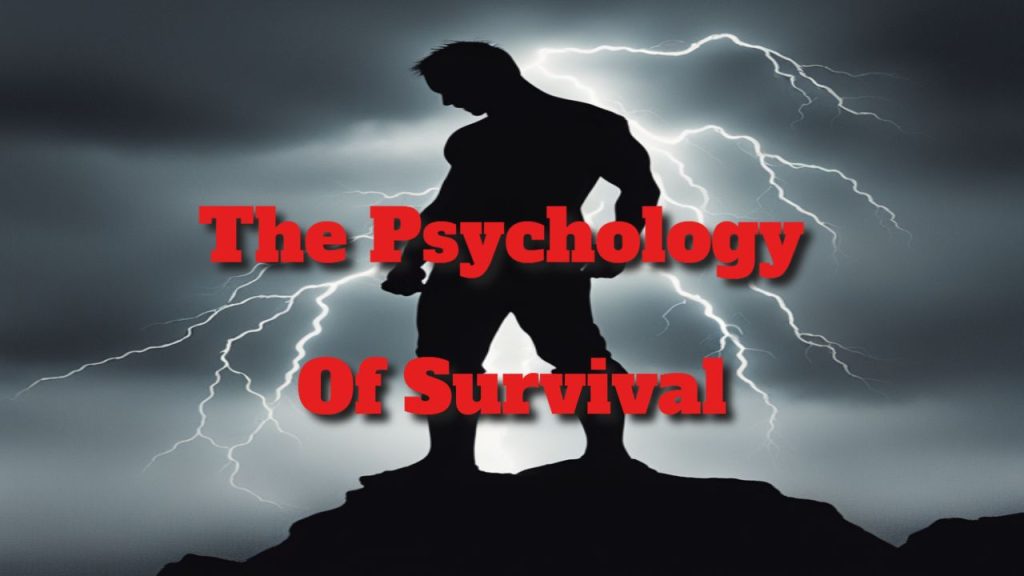Unlock Powerful Strategies to Excel in High-Stress Survival Situations
The phrase “desperate times call for desperate measures” captures the essence of survival, especially when we explore the intricate facets of survival psychology. Faced with serious threats, the human mind experiences a transformative change, revealing deep reservoirs of strength and resilience that often remain untapped in everyday life. This transformation encompasses more than just instinctive reactions; it represents a comprehensive mobilization of our mental and emotional resources, showcasing the astonishing potential of our minds when confronted with adversity. Understanding these psychological shifts is imperative for those looking to enhance their survival skills and strengthen their mental resilience, making this an essential topic for personal development and emergency preparedness.
In critical situations, a complex array of psychological mechanisms are activated within us. What occurs internally when every second counts? How do we navigate crucial decisions under immense pressure? Additionally, how does our innate psychological framework influence our capacity to endure, adapt, and ultimately thrive amidst chaos? These inquiries are fundamental to grasping the dynamics of survival psychology, which we will delve into in detail throughout this enlightening article. By shedding light on the core components that empower us to withstand intense pressure, we can uncover valuable insights into our inherent capabilities and behavioral responses during crises, thereby improving our preparedness and resilience.
Embark with us on an intriguing journey into the captivating world of survival psychology, where we will dissect its complexities and unveil the key elements that define our ability to overcome challenges and achieve success in perilous circumstances.
Explore the Impact of Fear on Our Survival Mechanisms and Reactions
Fear serves as a vital element of our survival instincts, acting as a primal response that prepares our bodies to respond swiftly to potential dangers. This intense emotion triggers a series of physiological changes aimed at enhancing our chances of survival during perilous encounters. When fear envelops us, significant physical transformations occur: our heart rate spikes, breathing quickens, and muscles tense, creating a heightened state of alertness readying us for immediate action. Recognizing these physiological responses is essential for anyone aspiring to improve their survival instincts and reaction capabilities.
This enhanced state of readiness sharpens our reflexes and accelerates decision-making, empowering us to effectively confront imminent threats. Moreover, fear intensifies our sensory awareness, enabling us to perceive our surroundings more acutely and identify potential dangers that might otherwise go unnoticed. It compels us to focus intently on our environment, enhancing vigilance and helping us recognize critical warning signs essential for survival. Without the influence of fear, our ability to navigate hazardous scenarios could be significantly impaired, underscoring its indispensable role in our survival toolkit. By comprehending the intricate interplay between fear and survival mechanisms, we deepen our appreciation for the complexities of human experience while equipping ourselves with practical knowledge applicable in real-life scenarios.
Cultivating Resilience to Overcome Life’s Most Daunting Challenges
In the midst of fear during high-stress scenarios, the capacity to nurture resilience becomes crucial for sustaining the fight for survival. Resilience is defined as the ability to recover from adversity, adapt to challenges, and rebound from setbacks, even in the face of overwhelming obstacles. This essential trait often sets apart those who surrender to despair from those who summon the inner strength to persist in their survival efforts. Actively cultivating resilience is a proactive step anyone can take to improve their overall life experience and enhance their capacity to face difficulties.
However, resilience does not signify the absence of fear or pain; rather, it exemplifies the unwavering determination to forge ahead despite emotional turmoil. It encompasses fostering a positive mindset, setting realistic goals, and skillfully leveraging available resources to navigate through hardships. By building resilience, individuals empower themselves to confront life’s challenges with confidence, equipped with the insights and strategies necessary for success. This transformative mindset is not only advantageous in survival contexts but also enriches one’s broader life journey, instilling hope and enabling individuals to tackle future challenges with renewed vigor and determination.
Sharpen Your Decision-Making Abilities Under Pressure for Optimal Results
The capacity to make informed decisions is frequently severely diminished in high-stress environments. The inherent urgency and pressure characteristic of critical moments can cloud our judgment, resulting in impulsive or poorly considered choices. During periods of extreme stress, the brain enters an elevated state of arousal, activating the fight-or-flight response, which can overwhelm rational thought processes and push individuals to rely more on instinct rather than reasoned analysis. Recognizing these patterns is vital for developing effective strategies to enhance decision-making.
This physiological response can significantly impair cognitive functions, rendering it increasingly difficult to process information and evaluate the pros and cons of different options. To counteract these effects, it is essential to understand how stress influences decision-making and to actively employ strategies that mitigate its impact. Techniques such as practicing deep breathing exercises, allowing brief moments for reflection, or seeking advice from trusted individuals can greatly enhance one’s ability to make informed and effective decisions. By refining decision-making skills in high-pressure situations, individuals can significantly improve their chances of successfully maneuvering through challenging and potentially life-threatening scenarios.
The Essential Role of Social Support in Effective Crisis Management
Acknowledging the significance of social support is critical for efficiently managing stressful situations. A robust network of friends, family, and colleagues provides invaluable assistance and resources, enabling individuals to cope and thrive during challenging times. The emotional backing, practical help, and sense of community offered by social connections are essential for fostering resilience and enhancing overall well-being. In any crisis, the strength derived from social support can dramatically influence the course of one’s experience.
Research consistently indicates that individuals with solid social networks experience improved mental health outcomes and recover more swiftly from traumatic experiences. Additionally, having a reliable support system enhances problem-solving abilities, introduces new perspectives, and provides essential motivation and encouragement. Recognizing the transformative power of social networks during times of crisis can significantly elevate one’s experience, allowing individuals to draw strength and insights from others when faced with adversity. Engaging with a supportive community not only aids in coping with immediate challenges but also fosters long-term emotional resilience and recovery, reinforcing the notion that we are not alone in our struggles.
 Practical Strategies to Effectively Cope with High-Stress Situations
Practical Strategies to Effectively Cope with High-Stress Situations
What actionable strategies can be implemented to successfully navigate life-threatening situations? Here are some effective tips:
– Maintain Calmness and Focus: Take a moment to breathe deeply while assessing your surroundings before taking action. This approach can help clarify your thoughts and sharpen your focus.
Prioritize Safety: Protect yourself and others by seeking shelter or moving away from immediate threats whenever possible. Your safety must always take precedence.
– Stay Aware: Remain vigilant regarding your surroundings, paying close attention to potential dangers or changes in the environment that could affect your safety.
– Communicate Clearly: If necessary, signal for help or inform others of the danger you are facing. Clear communication is crucial in survival scenarios.
– Trust Your Instincts: Rely on your gut feelings and make prompt decisions based on the information available to you. Your instincts can provide invaluable guidance.
– Utilize Available Resources: Maximize the use of all accessible tools and support systems to increase your chances of survival, whether they be physical resources or social support.
– Maintain an Optimistic Mindset: Foster a belief in your ability to overcome adversity. A positive outlook can significantly enhance your resilience and response to challenges.
Effective Coping Strategies for Trauma Survivors and Individuals with PTSD
For those with a history of trauma or PTSD, implementing effective coping strategies during life-threatening situations is crucial for managing anxiety and fostering resilience. Customizing these strategies can empower individuals to regain control over their responses and navigate crises more effectively.
– Practice Deep Breathing Techniques: Utilize grounding strategies to stabilize anxiety levels and cultivate a sense of calm. Deep breathing can help center your thoughts and mitigate panic.
– Seek Social Support: Don’t hesitate to reach out to friends, family, or mental health professionals for assistance. Connecting with others can provide critical support during challenging times.
– Engage in Self-Care Practices: Prioritize activities that enhance mental and physical well-being, supporting recovery and resilience building over time.
These coping mechanisms are vital for managing anxiety and cultivating resilience. It’s important to recognize that resilience is not merely an inherent trait; it can be actively nurtured through consistent practice and support. With the right strategies in place, anyone—regardless of their background—can enhance their capacity to recover from adverse situations.
Moreover, understanding how decision-making under stress influences long-term mental health and recovery from traumatic events is critical. The manner in which decisions are made during high-pressure situations can significantly shape recovery trajectories and overall mental health in the aftermath of life-threatening experiences.
Identifying the psychological barriers individuals face when seeking social support during crises is equally important. Common challenges during these pivotal moments may include feelings of vulnerability, fear of judgment, trust issues, and difficulties in expressing one’s needs. Acknowledging these obstacles is essential, as they can hinder the process of seeking help and exacerbate stress and anxiety.
To effectively navigate these hurdles and access the necessary support, consider taking manageable steps such as confiding in a trusted friend, consulting a mental health professional, or joining a support group. Remember, seeking help is a courageous step, and there are people ready and willing to assist you when you need it most.
Dive Deep into the Intriguing Domain of Survival Psychology
The psychology of survival represents a rich and multifaceted area of exploration that offers profound insights into human behavior. While anxiety is a natural response to life-threatening events, resilience is what empowers us to recover from adversity and continue moving forward. By understanding how stress affects decision-making, we can substantially enhance our chances of survival. Furthermore, acknowledging the vital role of social support provides the essential strength and comfort needed during challenging times.
Utilizing effective coping strategies enables us to navigate complex and life-threatening situations more adeptly, ultimately leading to enhanced resilience and improved mental health outcomes. This exploration of survival psychology not only deepens our understanding of our capabilities but also equips us with practical tools necessary to confront unforeseen challenges with confidence and tenacity.
Common Queries Regarding the Dynamics of Survival Psychology
How do anxiety disorders influence survival psychology?
What are the psychological differences in survival responses between individuals with anxiety disorders and those without?
Individuals with anxiety disorders may exhibit heightened reactions to fear and stress, while those without can engage in more adaptive coping strategies, leading to varying survival outcomes.
What coping strategies are most effective for trauma survivors or individuals with PTSD during survival scenarios?
The Article Survival Psychology: Understanding the Mindset Appeared First On Survival Avenue.
The post Survival Psychology: Mastering the Mindset appeared first on Survival Bite.
The Article Survival Psychology: Unlocking Your Mental Resilience Was Found On https://limitsofstrategy.com

I must say, your exploration of survival psychology strikes a chord deep in the caverns of my not-so-great survival instincts—let’s just say my most harrowing experience was pleading with a vending machine to dispense a caffeinated beverage during a particularly taxing afternoon at work. But it got me thinking: what if that urge to combat a mechanical foe is just the tip of the iceberg when it comes to tapping into our innate survival capabilities?
This exploration of survival psychology resonates deeply with me, especially as we consider the nature of human resilience in the face of adversity. I’ve often reflected on how some of my own pivotal moments in life—such as navigating personal challenges or unexpected crises—have pushed me to tap into strengths I never knew I had. It’s fascinating to think about how these psychological shifts not only aid in survival situations but also shape our everyday lives.